Undeterred by the sweltering heat, hundreds of TB activists and allies gathered at the Heartfelt Arena on Wednesday, 20 March, to march to the National Department of Health in Tshwane.
Despite tuberculosis being a treatable disease, data from the World Health Organization shows that in 2022, 54,200 people died from TB in South Africa. That is one person every 10 minutes.
This is why the Treatment Action Campaign, together with the TB Accountability Consortium, organised the march to demand that the government declare TB a national health crisis and that treatment for the preventable disease be prioritised.
With a memorandum in tow, the crowd meandered from the Heartfelt Arena to the Department of Health’s (DOH) head offices to demand that the government roll out its TB Recovery Plan throughout the country.
Outside the barred gates of the DOH head offices, health activist for the Rural Health Advocacy Campaign Russel Rensburg addressed the gathered crowd, saying, “ Unfortunately, TB is still one of those diseases where the health system sits and waits for us, and people are dying at home. As the Rural Health Advocacy Campaign, we stand in solidarity with you to ensure that in our lifetime, we can end TB and end these meaningless deaths”.
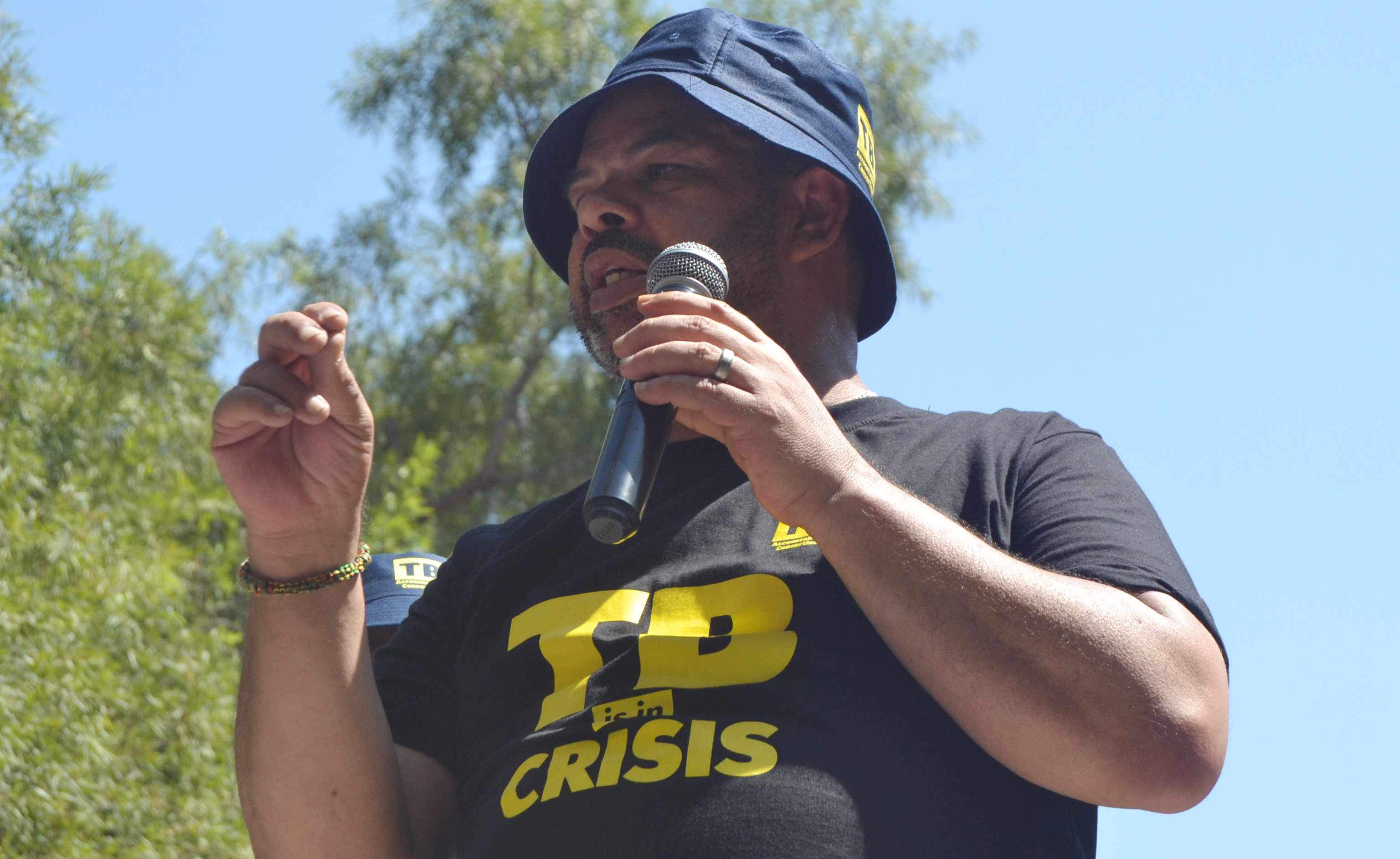 Russel Rensburg told a crowd of health activists outside the Department of Health in Tshwane on 20 March, that the government has a constitutional obligation to make TB treatment accessible to all. (Photo: Lerato Mutsila)
Russel Rensburg told a crowd of health activists outside the Department of Health in Tshwane on 20 March, that the government has a constitutional obligation to make TB treatment accessible to all. (Photo: Lerato Mutsila)
Challenges to TB treatment
TAC Secretary General Anele Yawa said that as the nation celebrates TB Awareness Month, many people are still contracting TB and dying from the preventable disease daily.
“Yet we have a government that continually cuts the budget, especially on HIV and TB services. We are going to the Department of Health to say enough is enough, we want more people to be saved,” Yawa said.
The TAC secretary-general added that patent laws were making it difficult to roll out “more effective, affordable” TB treatment, which could shorten patients’ treatment.
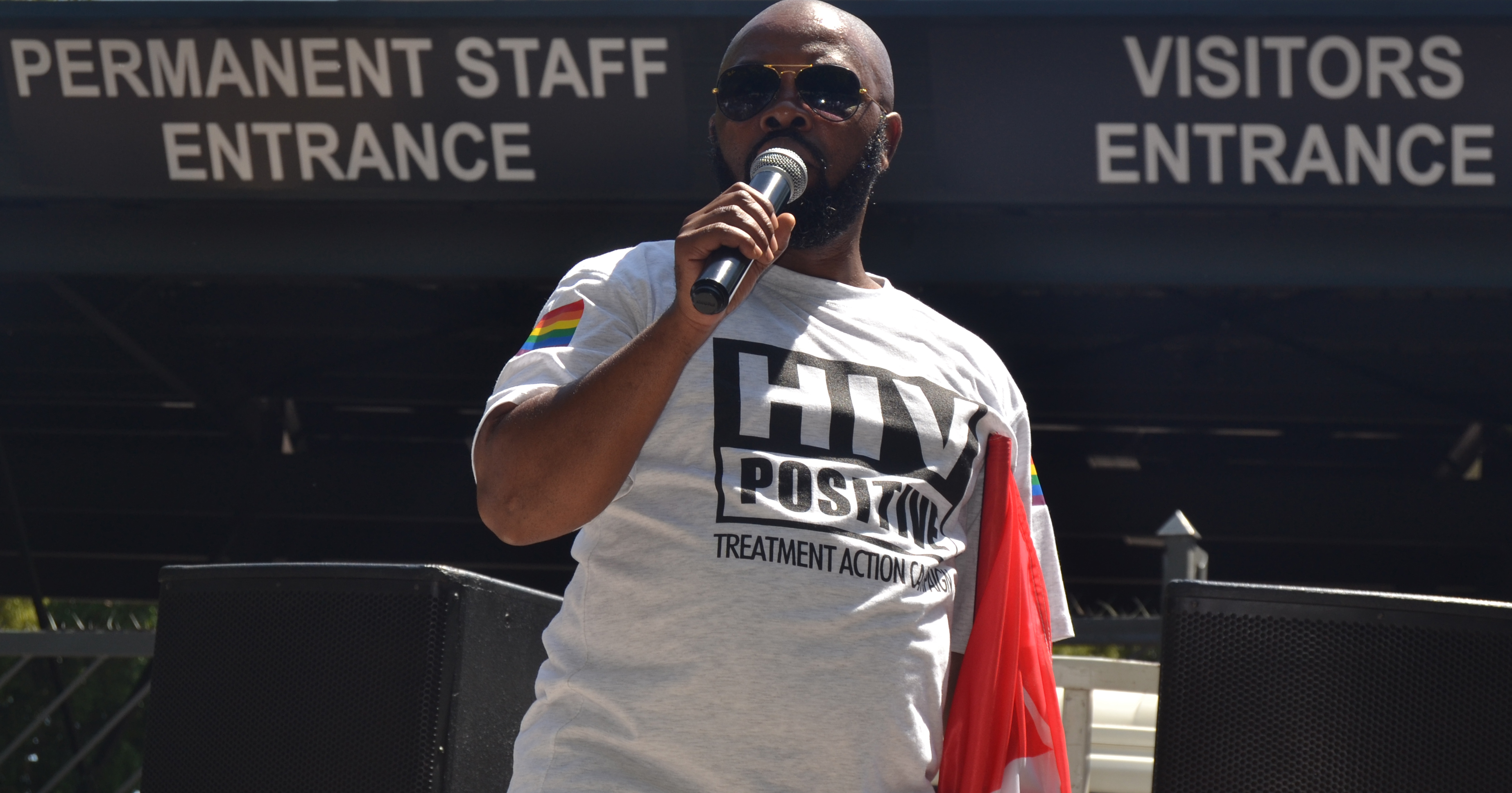 TAC Secretary General Anele Yawa addresses the crowd outside the Department of Health in Tshwane on Wednesday, 20 March. (Photo: Lerato Mutsila)
TAC Secretary General Anele Yawa addresses the crowd outside the Department of Health in Tshwane on Wednesday, 20 March. (Photo: Lerato Mutsila)
Read more in Daily Maverick: More bullying? J&J will be investigated for high TB drug prices and abuse of patent laws
Sihle Mahonga Ndawonde, TB Accountability Consortium project officer, said budget slashes to the Department of Health due to austerity measures made it difficult to ascertain how much money would be allocated to TB services.
“The protection of TB services is vital, but where there are budget cuts, people’s lives are cut. People die because of budget cuts, and this is a problem. The TB Accountability Consortium calls for the finance ministry to strengthen accountability in this regard,” Ndowonde said.
Ndawonde added that the 54,000 TB deaths reflect the failures of the DOH, which has been given the constitutional mandate to increase access to health.
Speaking to Daily Maverick, TB survivor and TAC activist Victor Mtshali said that because of the lack of awareness about TB and the treatments available, life can be a daily struggle for people living with TB.
“The main thing we are struggling with that no one is addressing is the socio-economic issues that many people with TB are facing. Unfortunately, many people with TB are poor and vulnerable. They complain that when they take their pills, they make them hungry, so they stop taking the treatment. As we call for government to make TB treatment a priority, we must also talk about how we address food insecurity.” Mtshali said.
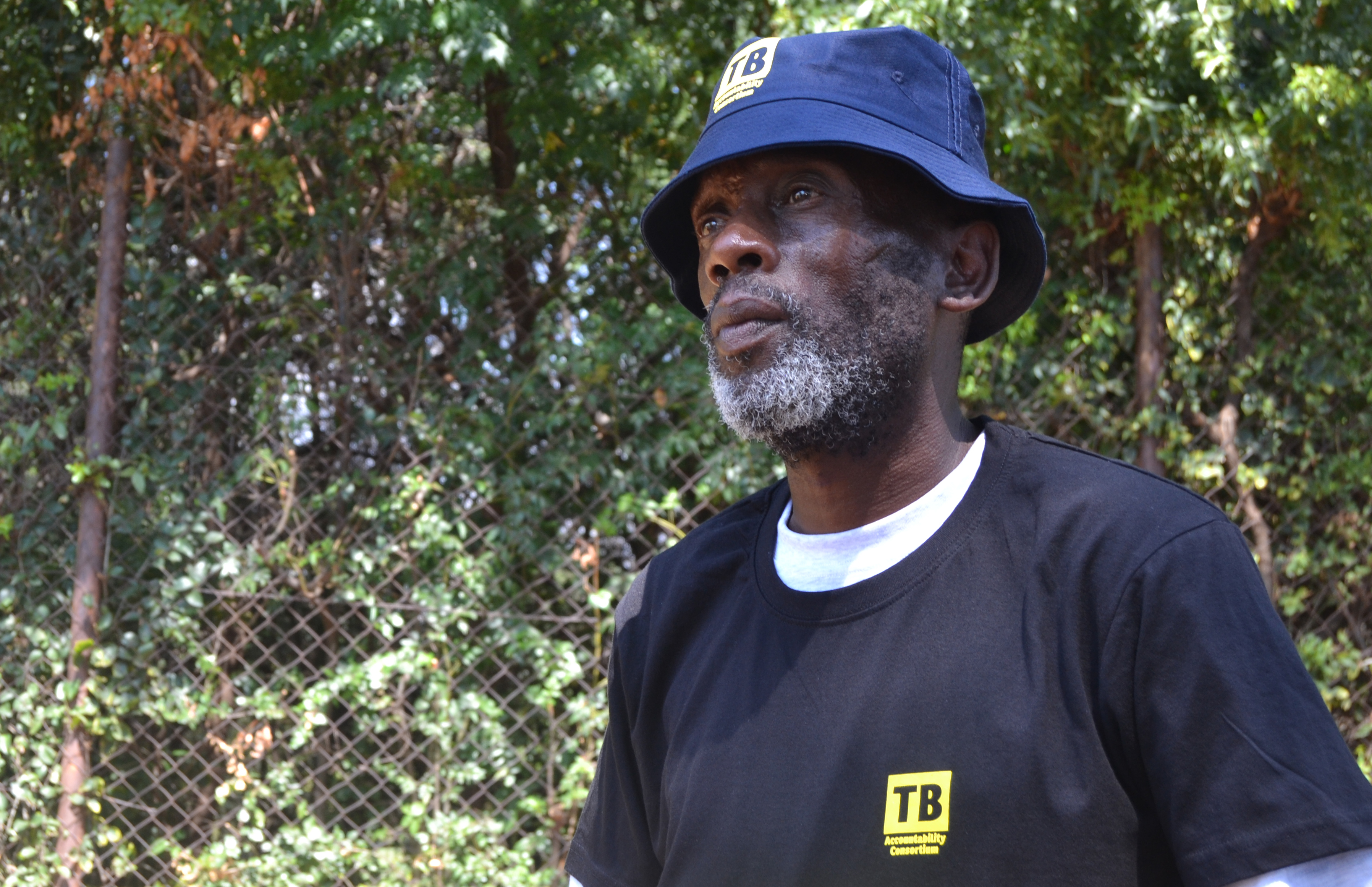 Health Activist Victor Mtshali says the government needs to tackle socioeconomic issues in tandem to ramp up TB treatment. (Photo: Lerato Mutsila)
Health Activist Victor Mtshali says the government needs to tackle socioeconomic issues in tandem to ramp up TB treatment. (Photo: Lerato Mutsila)
DOH promises response
As the TB activists sang, danced and gave moving speeches outside the DOH, health department representatives listened from afar behind a wall of officers in blue and separated from the protestors by a corrugated fence.
Eventually, acting Deputy Director General Ramphelane Morewane came out to meet the protestors and accept the memorandum. Despite making those gathered wait in the sweltering heat, the DOH representatives were greeted with cheers and ululation.
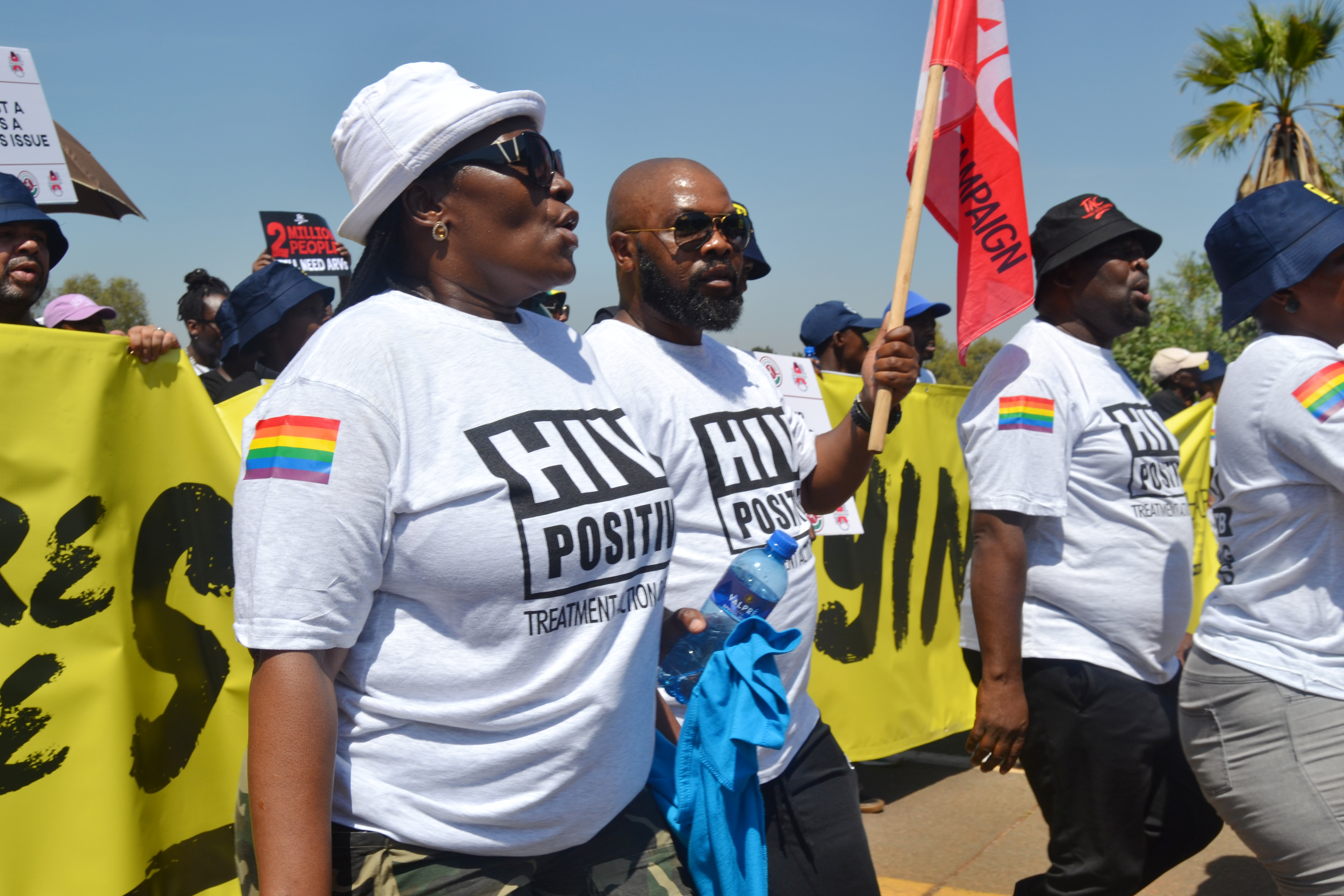 Treatment Action Campaign Chairperson Sibongile Tshabalala and TAC Secretary General Anele Yawa joined hundreds of other TB activists for a day of action. (Photo: Lerato Mutsila)
Treatment Action Campaign Chairperson Sibongile Tshabalala and TAC Secretary General Anele Yawa joined hundreds of other TB activists for a day of action. (Photo: Lerato Mutsila)
In reading the memorandum, TAC Chairperson Sibongile Tshabalala said the government needs to refocus its constitutional obligation on progressively realising the rights to health for all and setting out frameworks that will save lives.
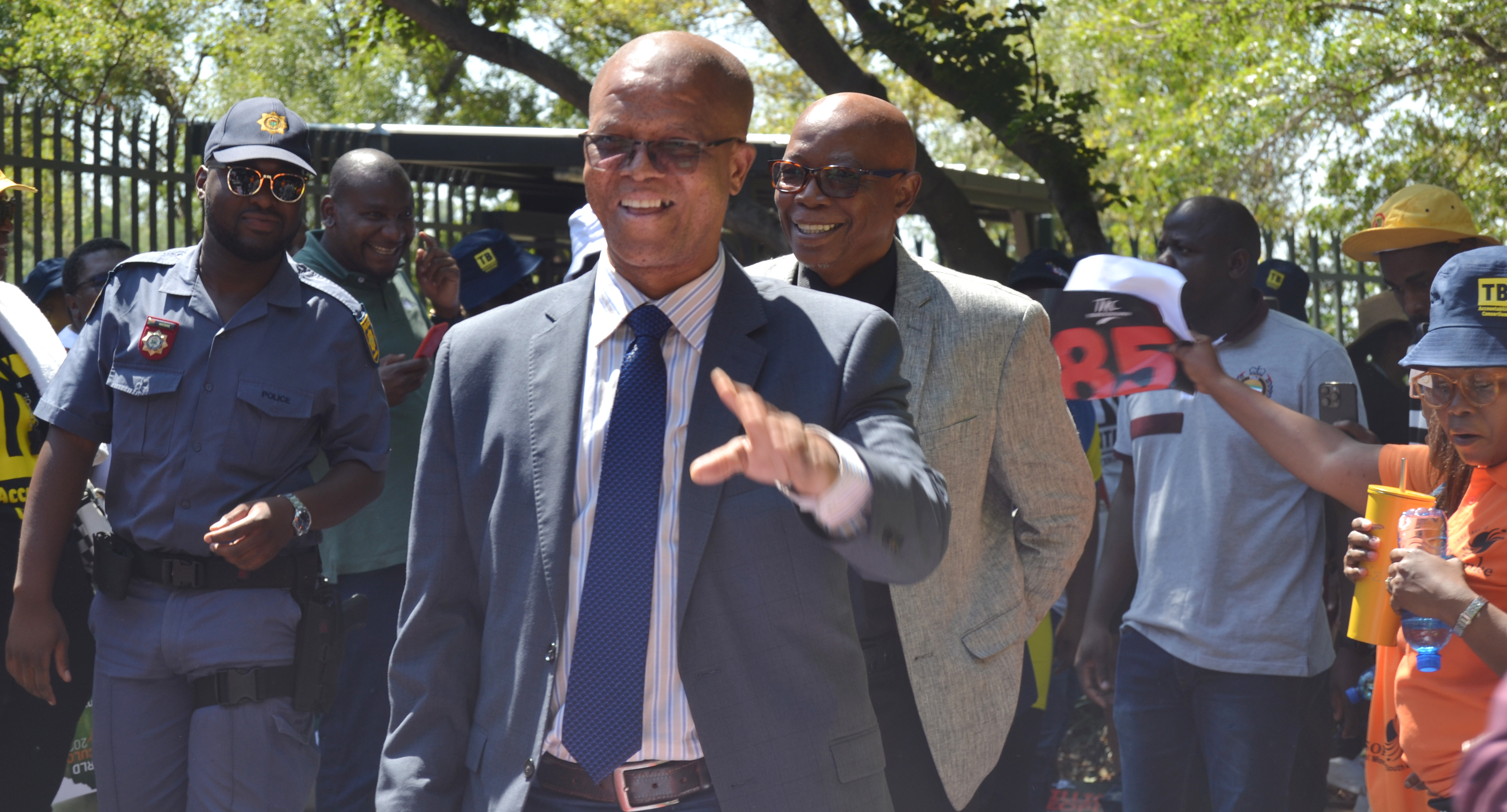 Acting DOH Deputy Director General Ramphelane Morewane greets a health activist outside the Department of Health in Tshwane on Wednesday, 20 March, 2024. (Photo: Lerato Mutsila)
Acting DOH Deputy Director General Ramphelane Morewane greets a health activist outside the Department of Health in Tshwane on Wednesday, 20 March, 2024. (Photo: Lerato Mutsila)
“54,000 people in South Africa should not be the casualties of government failure to fulfil this mandate,” Tshabalala said.
TBAC and TAC also demanded the following of the government, particularly the Minister of Health:
- Safeguard TB funding within increased District Health Services allocation: The government possesses powers to ringfence funding allocations, including the TB Recovery Plan.
- Strengthen inclusive decision-making: With all the information afforded to us, government needs to improve multisectoral engagement, ensuring communities are in the rooms where decisions are made. As referenced in the 2023 TBAC State of TB Report, bi-directional decision-making is the only way in which the realisation of the National Strategic Plan for HIV/TB & STIs 2023-2028 can be fulfilled. Let communities lead. Let the data be available for communities affected.
- Strengthen political will: The Deputy President, as the Chairperson of Sanac, must provide effective political leadership to ensure that our NSP is a living document and that we meet our targets on HIV and TB treatment.
The memorandum was received and signed by Morewane, who promised that the department would respond to the demands within seven to 14 days.
“We don't want to rush to answer. [We want to make sure that] when we answer, the things that we are answering are concrete. We will continue to work with the civil society forum at all levels to address all your needs,” Morenwane said.
When asked what the future steps are, Rensburg told Daily Maverick the reason they had the march before Human Rights Day was to go back to basics.
“As we move into the next administration, our goal today was really for TB to be a political priority. We are not trying to underscore the achievements that have been made because they have been significant, but we have this constitutional right of the right to healthcare, the obligation is to progressively realise, and with progressive realisation, we have to start with the people with the least access,” Rensburg said. DM




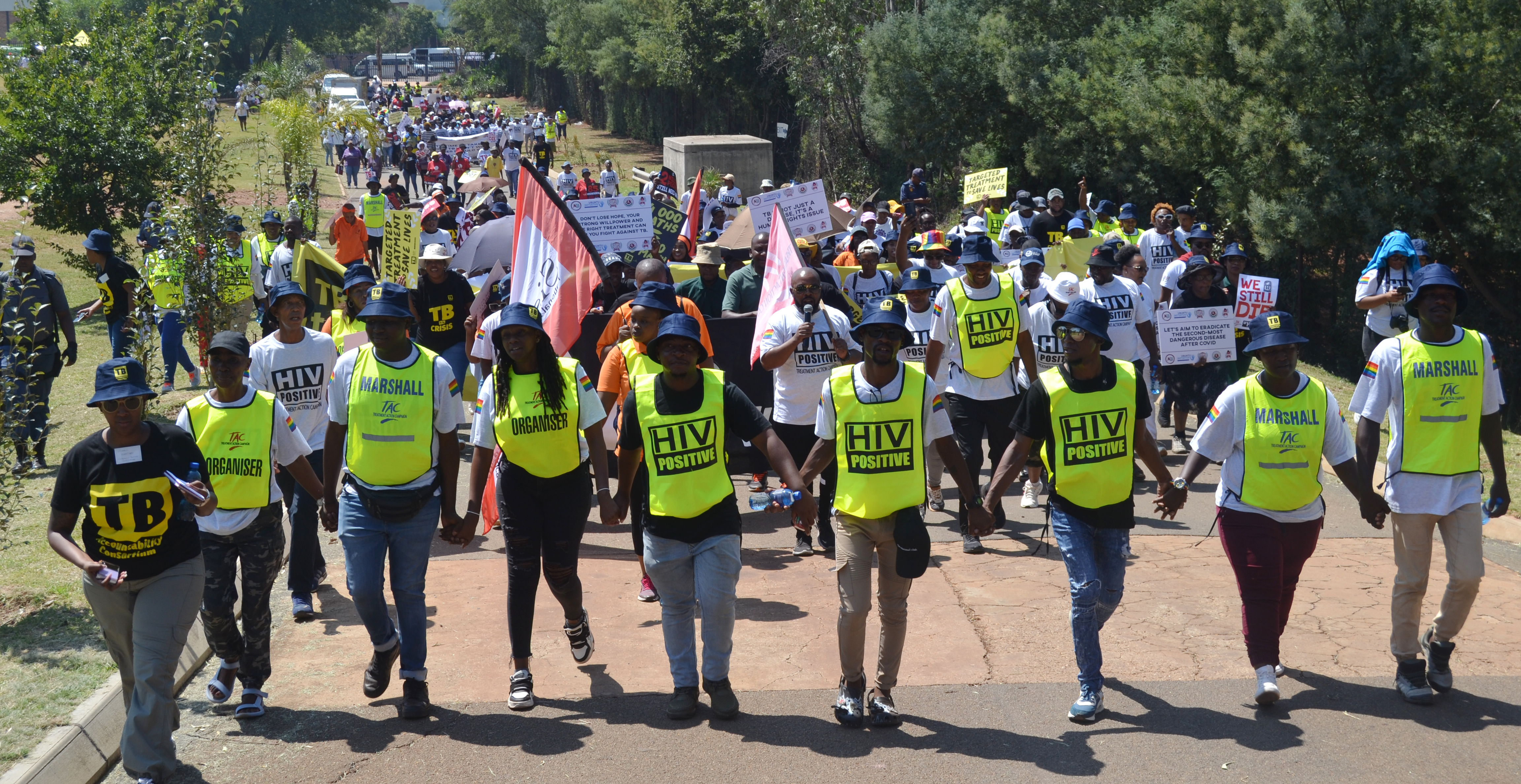 Acting DOH Deputy Director General Ramphelane Morewane greets a health activist outside the Department of Health in Tshwane on Wednesday, 20 March, 2024. (Photo: Lerato Mutsila)
Acting DOH Deputy Director General Ramphelane Morewane greets a health activist outside the Department of Health in Tshwane on Wednesday, 20 March, 2024. (Photo: Lerato Mutsila)